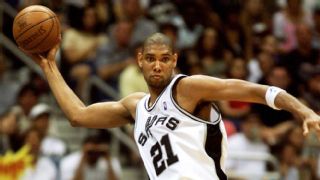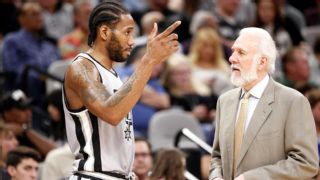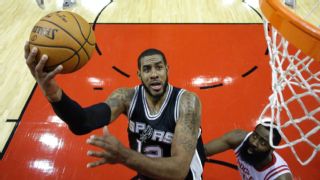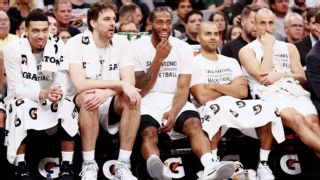Backed against a wall in front of reporters jammed into a tight hallway at Portland's Moda Center, San Antonio Spurs coach Gregg Popovich waited for questions following an April 10 loss to the Trail Blazers.
"Let's go," he barked five seconds in. "I'm ready to go get dinner."
Anybody who spends significant amount of time around Popovich knows he's prone to bouts of impatience. Especially when good food and wine are on the line. But anyone who has witnessed Pop build a perennial contender in the NBA over the past 20 years -- alongside general manager R.C. Buford and the Spurs ownership -- also knows he likes to plan ahead.
The result? Sixty-one more wins this season for San Antonio on the heels of losing franchise cornerstone Tim Duncan.
Think about it: The Spurs win so regularly, their future Hall of Famer has become an afterthought.
But let's not lose sight of the significance here: This year marked the first time in NBA history a team has won 60-plus games the season after losing a former MVP who spent his entire career with the same team. And it's just the second time in league annals a team captured 50-plus wins in the same scenario. The other time? You guessed it: The Spurs did it the season after David Robinson's departure.
"We realize this is not something common," Spurs guard Manu Ginobili told ESPN. "The truth is that we as a team, and me personally, we're lucky enough and good enough to be able to sign a guy like Kawhi [Leonard] at No. 15 in the draft. Then because of our history, whatever, we were able to sign a guy like LaMarcus [Aldridge] too, and convince him this is a place where he should play, and to play with T.D. and see what this is about. So I guess there's a lure in coming to play for this team.
"Adding those two guys makes you instantaneously a contender. Then, you always know that the front office is going to be good enough to add key pieces in different areas. It was a combination of things."
Luck has obviously served as a contributing factor in San Antonio's current run of 20 straight postseason appearances. Not a soul in the organization denies it.
"Certainly, the 1997 lottery ... it's not only the opportunity in the lottery, but also having a generational star like Tim," Buford told ESPN. "That changed the course of our organization for almost 20 years. So our best skill has been being really lucky. Again, pretty damned lucky. Then, hopefully, we're not screwing it up."
Popovich offered his take to ESPN.
"We're not full of ourselves thinking we invented the wheel or did some amazing thing," Popovich said.

The arrival of Duncan bought Popovich and Buford more time from ownership to build the team's culture. In that time, they unearthed stars such as Tony Parker and Ginobili, who fit their program, and later brought in Leonard, Aldridge and Pau Gasol.
Remember, back during San Antonio's first championship season in 1998-99, Popovich came under fire when the Spurs started off with a 6-8 record. On Feb. 28 of that lockout-shortened season, the Spurs were blown out at the Alamodome by the Utah Jazz, and Popovich was tossed after receiving a pair of technical fouls in the third quarter.
Fans booed. There was talk Popovich would be fired. But ownership stayed the course.
"Well, we know full well how fortunate we are to have the ownership we've had that allows us to do long-term planning," Popovich said. "It's pretty dependent on the vision of ownership -- how much patience they have, how much trust they have in you and how willing they are to look ahead. You never go in knowing what you're going to have, and I guess if you have success initially, it helps that trust build and grow."
Buford calls Popovich's vision "one of the great gifts" the coach has bestowed upon the organization.
"I think we've always tried to be thoughtful in planning for the future," Buford said. "But I think the other thing that has been helpful is the way that Pop has managed people's careers -- allowed Tim to play longer than maybe we would have expected, allowed Manu to play longer. As those generational players play longer, that helps you to sustain it.
"Pop has never focused our organization solely on, 'We've got to come up with the perfect team tonight.' He's always allowed us to plan. He's always been like, 'This is what's best for our team now. But let's not compromise what's best for the organization in the future.' So we live in that state all the time."
That's one of the first qualities Aldridge noticed after his first season with the Spurs last year.
"I feel like they're always thinking about the next step here," Aldridge told ESPN. "They've been grooming Kawhi to be in the light and kind of take over. I think that's what has made them so good. They've had guys that have been here for a long time, and I think that gives them time to groom the next guys up. And I think guys understand that playing here and playing for this organization is just about winning. I think that's why they always are able to keep it going."

For most teams, a 61-win season a year after losing a franchise icon wouldn't trigger trepidation about the future. But it's there. You can hear it in Buford's voice when he ponders what's next.
In addition to losing Duncan, the Spurs are in the midst of a succession in ownership. Julianna Hawn Holt replaced her husband, Peter Holt, as chairman and CEO of the franchise last March in what was considered somewhat of a bombshell of an announcement. Several within the organization say the new chairman and CEO has operated similarly to her predecessor in that she has given Buford and Popovich the same basketball autonomy granted by her now-retired husband.
Still, it's significant change.
Let's also not forget that Ginobili and Parker are in the twilight of their careers. Popovich won't be around forever, either.
That's a subject Buford won't even broach at this point.
"Yeah, there's a great deal of unknowns," Buford said. "We're not done with this transition just because Tim stepped away. It would be presumptuous to say that things are going to go the same way they have this year [in the future]. That would not be wise.
"But to have the influence of Tim for that long, for Manu, and their leadership, their mentorship, all that, has paid dividends for the development of younger players."
"I think our culture has been important to this group," Buford continued, "and my belief is that the next generation isn't going to adapt the past generation's culture just because. I think they're going to have to take ownership of their own culture. Whoever that next generation is -- Kawhi, LaMarcus -- I don't know how all that shakes out. But hopefully with good people, they'll take ownership of our culture; and with the leadership of our coaches, hopefully it'll resemble the culture of the past."

Parker -- who has played through San Antonio's various manifestations, having spent two seasons with Robinson, his entire career with Duncan and now the past six years with Leonard -- hopes so too.
"It's all about the team, the franchise," Parker said. "It started with George Gervin and 5-0 [Robinson's jersey number]. I played two years with 5-0. So I had a great example to follow. Then we got Timmy, then Manu. Now we're trying to show some of those same things to all the young guys coming up. With Kawhi and LaMarcus coming in, it's my job with Manu to show them all about how the Spurs' mentality is."
Duncan, meanwhile, continues to be a presence within the organization. He has attended Spurs workouts periodically since retiring, plays pickup with former teammates and is often seen working one-on-one against Gasol or talking to one of the club's younger players, such as Dejounte Murray. During San Antonio's opening-round playoff series against the Memphis Grizzlies, Duncan showed up at the team's shootaround just before Game 2 and then after Game 4 -- when the team got back to San Antonio -- to work with Aldridge. The Big Fundamental even has a locker inside the coaches' room at the Spurs facility, right next to the stall of Monty Williams, executive vice president of operations.

The truth of the matter is that many of the Spurs' former stars remain firmly entrenched in the San Antonio community, and that plays a role in the franchise's continuity.
"I think you build your franchise not around just one player, no matter how exceptional that player is," Gasol told ESPN. "That's what gives you the continuity. You build a culture that other great players want to be a part of, understanding that they're probably going to have to give up a part of themselves in their success and recognition. But the ultimate recognition, I think, is to win championships. That's what speaks over any individual accomplishment, especially in sports. So as long as you have that perspective, you can come here and be a part of this team."
Buford certainly hopes that continues to be the case, but he understands the future is still uncertain. So for now, Buford and everyone else in the organization will lean on the foundation they've built in San Antonio.
"Hopefully, we've planned for all this," Buford said. "We'll try to execute as well as we can, then we'll see. Tim carried us for a long time. Now, we're going to find out whether we can do it for real or not."

